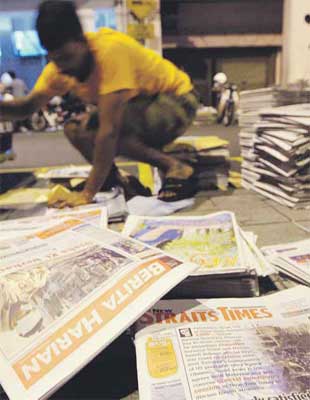Communicate from the heart
Professor Tan Sri Dato' Dzulkifli Abd Razak
Learning Curve : Perspective
New Sunday Times - 11/21/2010
THIS is my 16th year writing for the New Straits Times (NST). It started in 1994 to coincide with the establishment of Pusat Racun Negara (National Poison Centre) at Universiti Sains Malaysia (USM). Pusat Racun Negara also doubles as the World Health Organization Collaborating Centre for Drug Information. The former is a first for Malaysia; the latter, a first in Asia.
A weekly column in NST was a conduit for Pusat Racun Negara to help the public understand its role as well as gauge their expectations.
The column played a useful part, judging by the public's response. The centre also took action based on information provided by the public.
Over the years, the scope of the column expanded to engage the man in the street in other issues of interest, especially education, global events, science and health.
It has been rewarding to be able to reach out and learn from others. It can be difficult at times but that is the nature of any good discourse! It helps to build trust and mutual respect which is a must in the world of education.
Learning Curve : Perspective
New Sunday Times - 11/21/2010
THIS is my 16th year writing for the New Straits Times (NST). It started in 1994 to coincide with the establishment of Pusat Racun Negara (National Poison Centre) at Universiti Sains Malaysia (USM). Pusat Racun Negara also doubles as the World Health Organization Collaborating Centre for Drug Information. The former is a first for Malaysia; the latter, a first in Asia.
A weekly column in NST was a conduit for Pusat Racun Negara to help the public understand its role as well as gauge their expectations.
The column played a useful part, judging by the public's response. The centre also took action based on information provided by the public.
Over the years, the scope of the column expanded to engage the man in the street in other issues of interest, especially education, global events, science and health.
It has been rewarding to be able to reach out and learn from others. It can be difficult at times but that is the nature of any good discourse! It helps to build trust and mutual respect which is a must in the world of education.

There is a perception among academics that
writing for the newspaper is a futile effort because
it is not peer-reviewed
writing for the newspaper is a futile effort because
it is not peer-reviewed
Most unfortunate, however, is the perception among academics that writing for the newspaper is a futile effort because it is not peer-reviewed and therefore not worthy as a publication.
They railed at the idea that it is not captured in an indexed database and has no impact factor! In short, it is a waste of time. Above all, it is not one of the criteria for a world-class university.
So it is a pleasant surprise to read last week in Learning Curve that the National Professors Council (NPC) is keen to have its members "acquire media skills" and become "effective communicators".
"Not all professors can write in popular language, which makes complex issues more accessible to the public," says deputy chair of the council Professor Datuk Shamsul Amri Baharuddin.
There are about 1,500 professors from public universities alone, and if everyone contributes an article on their subject, there is enough to publish daily for years.
Unfortunately, some have little to write about for the general reader. Some are trapped in their self-made cocoon called the ivory tower -- the "bloodless academicians".
Cultural historian Russell Jacoby in his book The Last Intellectuals lamented the demise of a generation of public thinkers. The notion that intellectuals should lead in new thinking and shape the future is lost.
In a world that is changing at such a rapid pace, the shift towards intellectuals playing an active role to synthesise ideas for public consumption is on the rise.
Indeed, at the launch of the council, Prime Minister Datuk Seri Najib Razak raised the point about the development of a murabbi -- a holistic person who not only teaches but also nurtures the spirit and the soul.
A murabbi is not limited to a public intellectual.
This call is in line with the emergence of a third culture that must be mainstreamed in Malaysia to shake "bloodless academicians" out of their comfort zones.
They ought to be the new intellectuals whose discourses not only enlighten an elite group but also have far-reaching implications in engaging with an increasingly aware and intelligent public.
This is very much lacking in Malaysia since the intellectual community prefers to be low-key.
Intellectuals have been required to go through various intermediaries (read: seek permission) to convey their legitimate ideas for far too long that they have become apathetic.
For the third culture to flourish, a more honest and ethical relationship must first be forged to make dialogues more meaningful and constructive with the option to agree to disagree.
This is crucial if we want to create a learning community in an advanced knowledge economy in less than a decade.
A high-income nation cannot thrive in an opaque society which treats all things with suspicion because of a lack of open communication.
As such the initiative taken by the NPC and the media must be lauded so that a lasting impact can be achieved.
If my limited experiences are anything to go by, we must be able to communicate from the heart and not just the head as "bloodless academicians" are trained to do!
* The writer is the Vice-Chancellor of Universiti Sains Malaysia. He can be contacted at vc@usm.my
